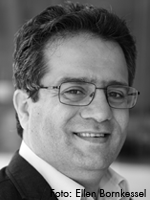Housamedden Darwish, PhD

Areas of Interest
- Modern and contemporary intellectual Arab thought
- Democracy and secularism in the Arab and Islamicate world
- Hermeneutics and intercultural/intracultural (mis)understanding
- Metaethics and thick normative concepts
- Conceptual analysis and history of concepts
(Mis)Understanding Thick Normative Concepts. The (In)Compatibility between (Political) Islam and the Secular Paradigm
The project focuses on certain aspects of language – thick normative concepts – considered objective factors of (mis)understanding in intracultural, intercultural and cross-cultural contexts, such as in the debate around the compatibility of (political) Islam and the secular paradigm.
In my dissertation, I focused on subjective factors of (mis)understanding, and suggested that the “ethics of dialogue or understanding” is important for mutual understanding in dialogue. However, such ethics, though necessary, are not sufficient to reduce the likelihood of misunderstanding. Objective factors are indispensable. The key concepts relevant to this study include, for example, ‘secularism’, ‘modernity’, ‘democracy’, ‘Islam’, ‘Shari’a’, ‘jihad’, ‘hijab’, and ‘civil state’. Most of these concepts are the outcome of specific historical, political or social circumstances in a given culture, but are nonetheless capable of traveling to other cultures. They also have an evaluative dimension, paving the way for many questions: what is the evaluative content or dimension of these concepts? How does the evaluative dimension relate to the descriptive one? Are these thick concepts fundamentally or inherently evaluative, as the semantic view maintains? Or are they only accidentally or unnecessarily evaluative, as expressed in the pragmatic view? If the evaluative and/or descriptive contents of a given concept can diverge completely from one culture to another, or from one context to another, can we still talk about the same concept?
Three research methods are employed to tackle these questions: conceptual analysis, philosophical analysis and textual and hermeneutical interpretation. While conceptual analysis focuses on the semantic and pragmatic aspects of the meaning, including its evaluation and its non-evaluative description, it is also important to consider its conceptual history to show how the meaning of the concept concerned is constructed and to identify the continuous and discontinuous base on which they were built. Moreover, a philosophical analysis is essential to comprehend a concept’s theoretical background, the judgments and presuppositions it implies, and its practical and theoretical relationships with other relevant concepts. Neither conceptual nor philosophical analyses could be carried out coherently without being accompanied by a hermeneutical interpretation of some of the basic texts of the given concept. A study of the meaning and the use of a concept in texts is valuable but not sufficient unless we consider its common and pragmatic meaning. The project also follows the historical development of the concepts relevant to the secular paradigm and the debate over their compatibility with (political) Islam, from the Arab Renaissance “Al-Nahda” until the present. This historical development helps to show why the aforementioned terms are thick concepts and to what extent there is (mis)understanding about their evaluative or normative significations and/or connotations, and how this (mis)understanding affects, to a large extent, the (dis)agreement between the protagonists (or antagonists) in the associated debate.
Biography
Senior Researcher, Humanities Centre for Advanced Studies "Multiple Secularities - Beyond the West, Beyond Modernities", Leipzig University, Germany
Visiting Researcher, Department of Oriental Studies, Faculty of Philosophy, University of Cologne, Germany
Assistant Professor, Department of Philosophy, University of Duisburg-Essen, Germany
Assistant Professor, Department of Oriental Studies, Faculty of Philosophy, University of Cologne, Germany
Fellow in the Volkswagen Foundation-project “A study in explanatory power” at the University of Duisburg-Essen, Germany
Visiting Researcher, Department of Oriental Studies, Faculty of Philosophy, University of Cologne, Germany
Mentor in The Jamiya Project for Syrian refugees
Social Worker (Betreuer) and Translator | Borough Council, Germany
PhD in Philosophy, Department of Philosophy, University of Bordeaux
“The Problem of Method in Paul Ricoeur’s Hermeneutics and its Relationship with the Human and Social Sciences: towards an Extension of Paul Ricoeur’s Hermeneutics”
Relevant Publications
- Darwish, Houssamedden. "On the Relationship between Philosophy and Religion, between Democracy and Islam: The Need for a Conceptual and Critical Analysis." Kalamoon 9, 2019.
- Darwish, Houssamedden. "On Secularity/Secularism: on the Problem of Form or Content." Asbar Journal of Research and Studies 6, 2019
- Darwish, Houssamedden. "Homophobia or Terrorizing the Homosexuals?" Syria Untold, 2019.
- Darwish, Houssamedden. "On the Israeli/Jewish Issue: The Arabic-Islamic Taboo vis-á-vis the Western/German Taboo." Syria Untold, 2019.
- Darwish, Houssamedden. "Multiplicity of Religions: Between Desire for Harmony and the Difficulty of Acceptance of Difference." Syria Untold, 2019.
- Darwish, Houssamedden. "On the Relationship between Culture and Politics: a Critique of the Culturalist Approach." Kalamoon 4,(2018): 29-45.
- Darwish, Houssamedden. "On the Understanding of Al-Azm's Thought: between Philosophism, Ideologism and Scientism." Awraq 8 (2017): 57-71.
- Darwish, Houssamedden. Critical Texts on Arab Political Thought, Syrian Revolution and Asylum. Beirut: Arab Scientific Publishers, 2017.
- Darwish, Houssamedden. The Problemathique of Method in Paul Ricoeur's Hermeneutics and its Relationship to the Humanities and Social Sciences: towards establishing hermeneutics of dialogue. Doha: Arab Center for Research & Policy Studies, 2016.


